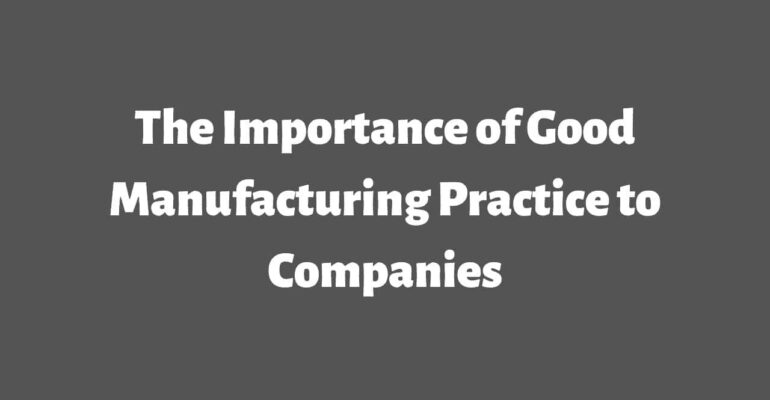The Importance of Good Manufacturing Practice to Companies
The Importance of Good Manufacturing Practice to Companies
So, let’s start with the basics—what exactly is GMP? Good Manufacturing Practices, or GMP, are a set of guidelines that companies follow to ensure their products are consistently made to the highest quality standards. Whether you’re in the food, cosmetics, or pharmaceutical industry, these practices are crucial for ensuring that what you produce is safe, reliable, and effective for consumers.
At its core, the importance of GMP is about establishing a reliable, repeatable system for manufacturing. Think of it as a recipe for success—if you follow the steps carefully and measure everything precisely, you’ll get the same great result every time.
Definition of Good Manufacturing Practices
In simple terms, GMP is a system for ensuring that products are produced under controlled conditions that meet the highest standards for safety and quality. These standards cover everything from the materials you use to the equipment in your facility, and even the training of your employees. By following GMP guidelines, you reduce the risk of errors, contamination, or inconsistencies, which could lead to health risks or product recalls.
The importance of GMP cannot be overstated, especially in industries like food and cosmetics, where consumer safety is paramount. When a company adheres to GMP, it assures consumers and regulators that the product is safe for use and manufactured with care.
Key Elements of GMP
So, what are some of the core components that make up GMP requirements? There are several, but here are the key ones you need to know about:
- Personnel Training: Your team needs to be properly trained to carry out GMP procedures. This ensures that everyone is aware of the standards they need to meet and that products are manufactured correctly from start to finish.
- Facilities and Equipment: Properly maintained facilities and equipment are essential. GMP ensures that your manufacturing environment is clean, organized, and free from contamination, and that your equipment is functioning properly at all times.
- Raw Materials and Packaging: GMP also includes guidelines for sourcing, storing, and handling raw materials and packaging. This ensures that every ingredient used in your product is safe and doesn’t compromise the final result.
- Documentation and Record-Keeping: A major part of GMP is keeping detailed records of everything—from raw materials and production batches to employee training. This documentation helps you track processes, identify issues, and prove compliance if necessary.
In the next section, we’ll talk about why the importance of GMP goes beyond just safety—it helps with product consistency, regulatory compliance, and can even save your company money. Ready to dive into the benefits? Let’s go!
The Importance of GMP for Companies
Now that we’ve covered what GMP is and its key components, let’s talk about the importance of GMP for companies. It’s not just about meeting a set of standards—it’s about ensuring that your business runs smoothly, your products are safe, and your customers trust what you’re selling. There are a lot of compelling reasons why adopting GMP practices can transform your business, so let’s dive into how it can benefit your company.
Ensuring Product Quality and Consistency
One of the biggest advantages of following GMP is the impact it has on product quality. When you stick to GMP guidelines, you’re creating a system that ensures your products are consistently manufactured to the highest standards, batch after batch. This means that no matter when a consumer buys your product, they can trust that it will meet the same quality expectations they’ve come to rely on.
Think of it like baking cookies—if you follow the recipe and measure everything carefully, you’ll get the same delicious cookies every time. Without following a reliable recipe, though, the results could vary, leaving your customers frustrated. The importance of GMP here is clear: it gives your business the ability to deliver consistent quality, which leads to satisfied customers and repeat business.
Regulatory Compliance and Risk Management
Another key reason to implement GMP is regulatory compliance. Many industries, especially food, pharmaceuticals, and cosmetics, are heavily regulated. GMP certification ensures that you’re meeting the standards set by regulatory bodies, such as the FDA or the European Medicines Agency. By following GMP requirements, you reduce the risk of non-compliance, which could lead to fines, product recalls, or even legal action.
What’s more, adopting GMP helps you manage risks. Whether it’s preventing contamination, ensuring proper labeling, or minimizing errors during production, GMP practices reduce the chances of something going wrong. By proactively addressing these issues, you protect your business from costly problems down the road. In a way, the importance of GMP lies in its ability to act as a safety net, catching issues before they escalate.
Improving Operational Efficiency
Another underappreciated benefit of GMP is the improvement it brings to operational efficiency. While it might seem like following strict procedures takes extra time, it actually helps streamline processes in the long run. By setting clear guidelines for every step of production, you eliminate confusion, reduce waste, and make the entire process more efficient.
- Less waste: By standardizing your processes, you make sure that materials are used efficiently, which can save money and reduce waste.
- Fewer errors: With clear procedures in place, you reduce the chances of mistakes. Less time spent fixing errors means more time focusing on growing the business.
- More predictable production: GMP ensures that the process is repeatable, making your production schedules more predictable, which helps with planning and inventory management.
By improving your operational efficiency, GMP can help save your business money, reduce downtime, and ensure you’re operating at peak performance.
Why This Matters
In the fast-paced world of manufacturing, the importance of GMP can’t be overstated. It’s about more than just meeting regulations—it’s about setting your company up for success. When you implement GMP practices, you create a strong foundation that leads to consistent product quality, lower risks, and greater operational efficiency.
In the next section, we’ll explore how adopting GMP not only helps your company but also enhances your brand’s reputation and builds trust with customers. Let’s continue!
The Benefits of GMP for Companies
Adopting Good Manufacturing Practices (GMP) isn’t just a requirement; it’s a game-changer for your business. The importance of GMP goes beyond regulatory compliance—it brings tangible benefits that can positively impact your bottom line, enhance your brand reputation, and even foster long-term customer loyalty. So, let’s dive into some of the key benefits that GMP certification brings to the table and why it’s such a valuable investment for your company.
Boosting Customer Confidence
One of the most powerful benefits of following GMP is the boost it gives to your brand’s reputation. Consumers today are more informed than ever, and they care about the products they use—especially when it comes to personal care, food, and health-related products. By demonstrating your commitment to high manufacturing standards, you not only ensure product safety and quality but also build trust with your customers.
When people see that your products are GMP certified, they know that you’ve taken every precaution to ensure their safety and satisfaction. This leads to higher customer confidence, which is invaluable in today’s competitive market. And let’s face it—when customers trust your brand, they’ll keep coming back, and they’ll also spread the word to others.
Enhancing Brand Reputation and Market Position
In a crowded marketplace, a strong reputation can set your brand apart. GMP certification provides the kind of credibility that can elevate your brand and position it as a leader in your industry. It shows that you’re not just concerned with making a quick profit, but that you care about producing quality products that adhere to strict standards.
Think of it like a badge of honor: by being GMP-compliant, you demonstrate to potential customers, partners, and investors that you take your operations seriously. For example, retailers are more likely to choose brands with GMP certification, knowing that their products meet rigorous safety and quality standards. This can open the door to more retail opportunities and broader market reach.
In addition to attracting new customers, the importance of GMP is also evident in how it enhances relationships with existing ones. A solid reputation for quality and safety fosters customer loyalty, and we all know that repeat customers are the backbone of a thriving business.
Long-term Financial Benefits
At first glance, the investment required for GMP certification may seem like a big commitment. However, the importance of GMP is evident in the long-term financial benefits it offers. In the end, adhering to GMP practices helps companies save money and improve profitability in several key ways:
- Reduced risk of product recalls: One of the most expensive things a company can face is a product recall. Not only are there direct costs involved, but there’s also the damage to your brand’s reputation. By adhering to GMP, you reduce the risk of contamination or defects, which can save you from costly recalls and the accompanying PR nightmare.
- Better operational efficiency: By implementing standardized processes and maintaining equipment properly, you reduce the chances of delays or errors during production. This leads to fewer costly mistakes and a more streamlined operation, saving time and money.
- Fewer regulatory fines: Compliance with GMP means you’re following the rules. When you’re compliant with regulations, you avoid fines, penalties, and potential legal issues, which can eat into your profits.
In short, GMP compliance is an investment that more than pays for itself over time by reducing risks and improving operational performance.
Expanding Business Opportunities
GMP certification also opens the door to new business opportunities. Many global markets and retailers require GMP certification before allowing products to be sold on their shelves. Whether you’re looking to expand into international markets or partner with larger retailers, the importance of GMP lies in its ability to help you meet the necessary requirements to access these opportunities.
Furthermore, suppliers and business partners are more likely to work with you if you are GMP-certified. It’s a clear signal that you operate with integrity, quality, and compliance in mind—traits that are highly valued in any industry. Whether you’re working with manufacturers, distributors, or retailers, GMP certification gives you a competitive edge and strengthens your credibility within the industry.
The Bottom Line
By now, it’s clear that the importance of GMP extends far beyond meeting regulatory requirements. It plays a pivotal role in boosting consumer confidence, enhancing your brand’s reputation, improving operational efficiency, and even opening new doors for business opportunities. In today’s competitive market, investing in GMP certification is one of the smartest decisions you can make for your company’s long-term success.
Ready to take the next step? Adopting GMP practices will set you on the path to growth, efficiency, and customer satisfaction—ensuring that your company stands out for all the right reasons.
Steps for Implementing GMP in Your Company
Now that we’ve explored the importance of GMP and its benefits, you might be wondering, “How can I get started?” The good news is that implementing Good Manufacturing Practices doesn’t have to be overwhelming. It’s all about creating a structured approach, setting clear goals, and taking it one step at a time. Let’s break it down into manageable steps to help you get on the path to GMP certification and reap all the advantages we’ve discussed.
1. Assess Your Current Processes
The first step in implementing GMP is to assess where you stand right now. Take a look at your current manufacturing practices and identify any gaps or areas that need improvement. Here are some things to evaluate:
- Quality control measures: Are you conducting regular tests on your products to ensure they meet safety and quality standards?
- Employee training: Are your employees well-trained in GMP procedures, or do they need more education on the latest guidelines?
- Facilities and equipment: Are your facilities clean and well-maintained? Do you have proper equipment that meets the standards required by GMP?
By evaluating your existing systems, you’ll have a clearer picture of where improvements are needed to align with the Importance of GMP.
2. Develop a GMP Implementation Plan
Once you’ve assessed your current processes, it’s time to create an actionable plan for implementing GMP. This plan should outline:
- Specific objectives: What do you want to achieve with your GMP implementation? Whether it’s ensuring product safety, improving consistency, or reducing waste, be clear about your goals.
- Timeline: Create a timeline that breaks down the steps you need to take. Start with immediate improvements, then plan for long-term changes.
- Resources: Identify the resources you’ll need, whether that’s investing in new equipment, hiring additional staff, or implementing new software for tracking quality control.
A solid plan will give you direction and help you stay organized as you move forward with GMP certification.
3. Train Your Team
Training is a crucial part of the GMP implementation process. If your team doesn’t understand the standards and practices they need to follow, it will be difficult to maintain compliance. Here’s how to approach training:
- GMP training for all staff: Every employee, from production workers to supervisors, needs to understand GMP principles. Hold regular training sessions and ensure everyone knows their role in maintaining GMP standards.
- Documentation and record-keeping: Make sure employees are aware of the importance of documentation and understand how to keep accurate records. This is critical for meeting GMP requirements.
- Ongoing education: Don’t stop at initial training. Make GMP training an ongoing process so that employees stay up to date with any changes or updates to the standards.
A well-trained team is essential for successful GMP implementation and will be your biggest asset in maintaining high standards across the board.
4. Create a Robust Document Control System
One of the key components of GMP is having a solid documentation system in place. Why? Because proper documentation ensures traceability, accountability, and transparency. Here’s how you can get started:
- Establish a centralized storage system: All documentation, from batch records to training logs, should be stored in an easily accessible, organized system.
- Create standard operating procedures (SOPs): Develop clear, written procedures for every part of your manufacturing process. These should outline the exact steps to take and the documentation required at each stage.
- Version control: Keep track of updates to any documents and ensure that everyone is working with the most recent version. This will help avoid mistakes and maintain compliance.
By having a strong document control system in place, you’ll make it easier to stay compliant with GMP and pass audits without any issues.
5. Regular Audits and Continuous Improvement
Implementing GMP is not a one-time effort—it’s an ongoing process. Regular audits are essential for ensuring that your company continues to meet GMP requirements over time. Here’s how to stay on top of things:
- Internal audits: Schedule regular internal audits to check for compliance and identify areas for improvement.
- External audits: Once you’ve been following GMP practices for a while, you’ll want to go through an external audit to receive your GMP certification.
- Feedback loop: Use audit results and employee feedback to continually improve your processes and fine-tune your GMP implementation.
By embracing the idea of continuous improvement, you’ll ensure that your company remains compliant and always strives to do better.
Why This Matters
The steps for GMP implementation may take time, but the importance of GMP in the long run far outweighs the initial effort. Not only does it help ensure product safety, improve quality, and streamline operations, but it also opens doors to new markets and enhances your brand reputation.
As you begin this process, remember that implementing GMP is about creating a culture of quality within your company. By taking these steps, you’ll not only meet regulatory standards but also set your business up for sustained success.
In the final section, we’ll wrap up the entire process and reinforce the key reasons why adopting GMP practices is essential for your company’s growth and long-term success. Let’s take the final step!
Conclusion: Embracing the Importance of GMP for Long-Term Success
By now, we’ve explored just how critical GMP implementation is for companies. If you’ve been following along, you’ve seen how these guidelines aren’t just a regulatory hurdle, but a path to better quality, increased consumer trust, and smoother operations. But what does it all mean for your company’s long-term success?
The Big Picture: Why GMP Matters
At the end of the day, the importance of GMP goes far beyond meeting regulatory requirements. Sure, compliance is crucial, but the real value lies in what GMP brings to your business: safety, consistency, and trust. When you adopt GMP practices, you’re not just making your products safer—you’re building a brand that consumers can rely on. Whether it’s food, cosmetics, or pharmaceuticals, customers expect quality, and they want to feel confident that the products they purchase are produced with care.
GMP also helps your company stay ahead of the curve. As regulatory requirements evolve and industries grow, businesses that are already compliant with GMP have a head start. You’re not just adapting to current standards, but preparing your company for the future.
The Ripple Effect of GMP Implementation
The ripple effect of the importance of GMP in your company is significant. Think about it:
- Operational improvements: With clear guidelines and structured processes, your team will be more efficient, reducing errors and saving time and money.
- Stronger partnerships: GMP certification opens doors to better business relationships. Suppliers, distributors, and retailers often prefer working with GMP-certified companies because they know you’re committed to maintaining high standards.
- Market competitiveness: Whether you’re a small start-up or a well-established company, adopting GMP practices helps your products stand out in a crowded market. It gives your brand an edge and sets you apart from the competition.
What’s Next?
The good news despite the Importance of GMP, implementing GMP doesn’t have to be overwhelming. As we’ve discussed, the process can be broken down into manageable steps: assessing your current processes, training your team, improving your facilities, and setting up documentation systems. With each step, you’ll be building a more reliable, compliant, and efficient operation in according with the Importance of GMP.
So, what’s next for you? Start by making a plan to implement GMP practices in your company. Whether you’re a small business just starting out or a larger operation looking to refine your processes, it’s never too late to take action. Remember, the importance of GMP is in its ability to help your company grow and succeed, not just today, but for years to come.
Ready to make your company safer, more efficient, and more trustworthy? Embrace GMP implementation, and take the first step toward long-term success. Your customers—and your bottom line—will thank you!
👋 Hi, I’m HAFSA, and for the past 12 years, I’ve been on a journey to I’m an engineer specialized in the food and agricultural industry Let’s make ISO less about stress and more about success! 🙏
make ISO standards less intimidating and more approachable for everyone.
Whether it’s ISO 9001, ISO 22000, or the cosmetics-focused ISO 22716,
I’ve spent my career turning complex jargon into clear, actionable steps
that businesses can actually use. I’m not here to call myself an expert—I prefer “enthusiast” because I truly love what I do.
There’s something incredibly rewarding about helping people navigate food safety and quality management systems
in a way that feels simple, practical, and even enjoyable.
When I’m not writing about standards, you’ll probably find me playing Piano 🎹, connecting with people, or diving into my next big project💫.
I have a Master’s in QHSE management and over 12 years of experience as a Quality Manager
I’ve helped more than 15 companies implement ISO 9001, ISO 22000, ISO 22716, GMP, and other standards
My clients include food producers, cosmetics manufacturers, laboratories, and service companies
I believe quality systems should be simple, useful, and efficient
Outside of work, I play piano and love learning something new every day
Looking for More Resources on ISO 22716?
If you found this article helpful, explore our premium resources designed to help you achieve ISO 22716 certification efficiently:
- 📦 Complete Documentation Package for ISO/IEC 22716 2017: Get all the essential templates and documents you need for fast, easy implementation.
- 🎓 Online Course on ISO/IEC 22716 2017 : Enroll in our comprehensive training to master the key concepts and practical steps toward certification.
- 📋 ISO/IEC 22716 2017 Checklist: Download our detailed checklist to ensure you’ve covered every step of the process.
These resources are tailored to meet your needs and ensure a smooth certification journey. Explore them today and get one step closer to success!
















